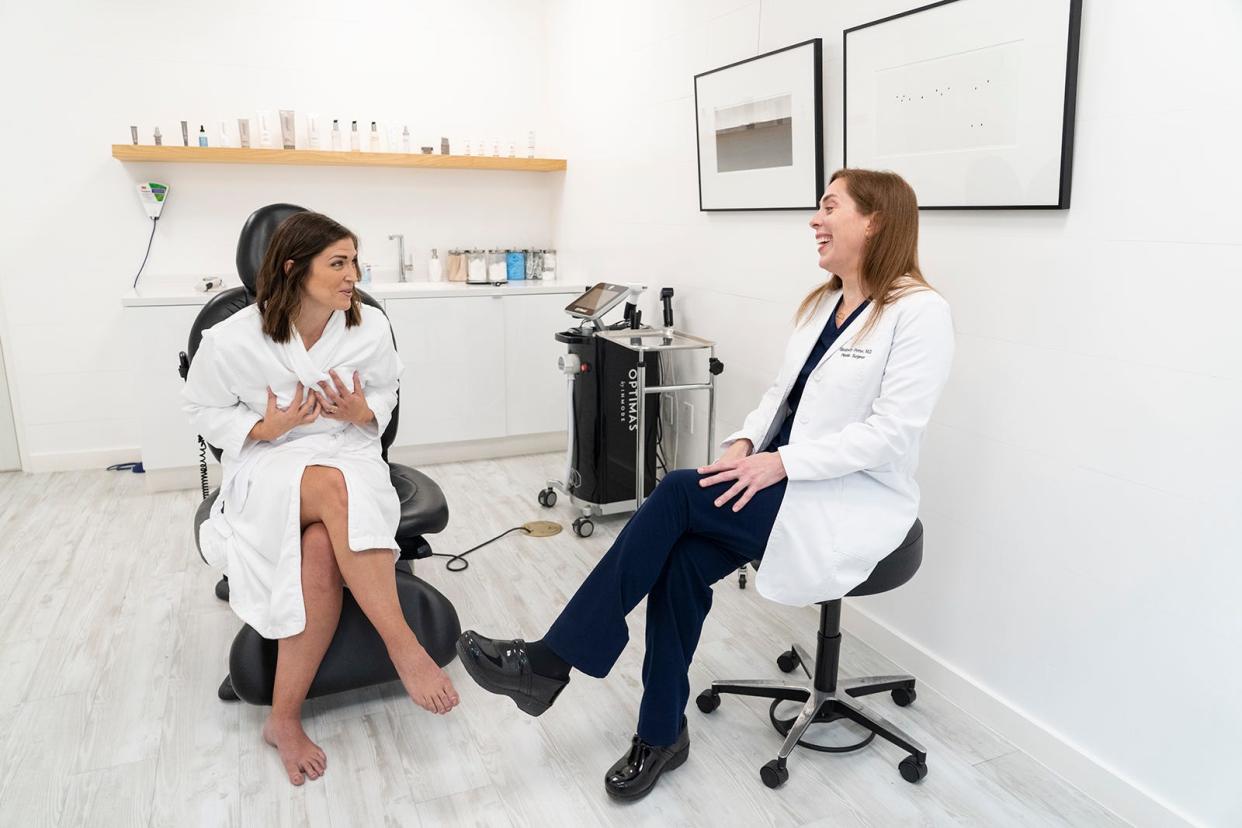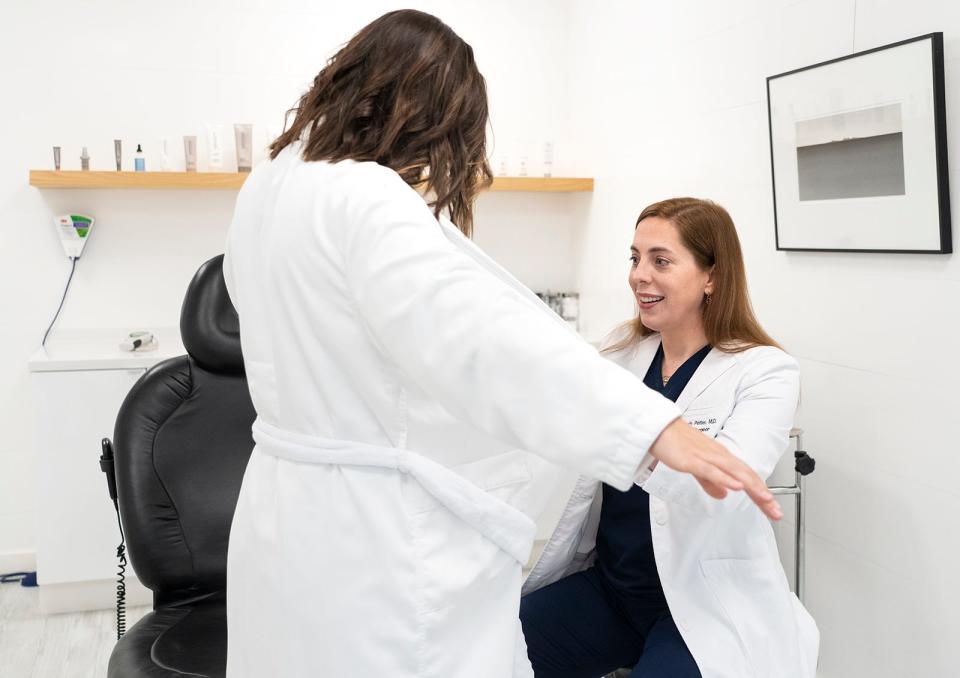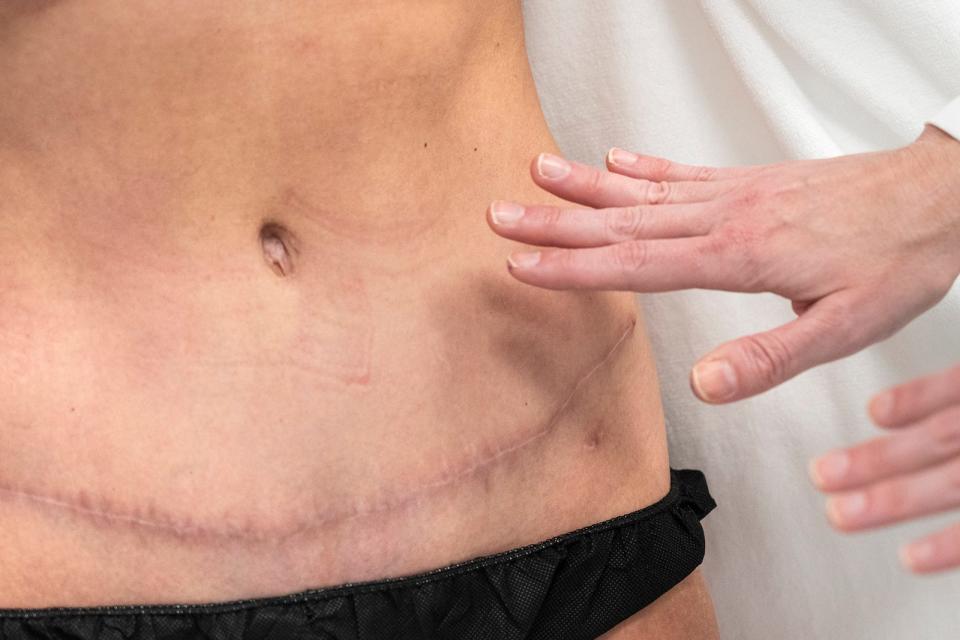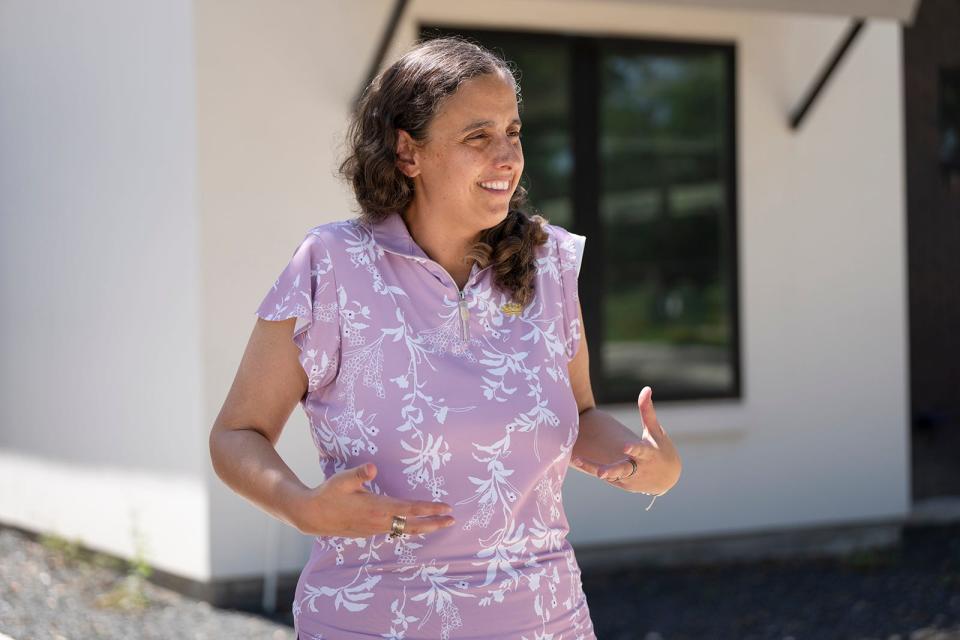Breast reconstruction surgery after cancer could be limited by medical code change

Victoria Hodson loves to play hockey with her kids and ride horses with her 11-year-old daughter. And she loves that her body doesn't betray her.
With clothes on, no one would be able to tell that this 45-year-old Austin mom of four had breast cancer in December 2020 and went through a year of chemotherapy, a double mastectomy, radiation and breast reconstruction.
More than a year after diagnosis, Hodson had her reconstruction surgery in March 2022. She was able to get a procedure known as a DIEP flap (deep inferior epigastric perforators) to create breasts.
Her plastic surgeon, Dr. Elisabeth Potter, took blood vessels, fat and skin from her belly and transplanted it to form breasts.
The DIEP flap surgery meant that Hodson could close the chapter on her breast cancer recovery and still have her abdominal muscles intact. Other breast reconstruction surgeries remove abdominal muscles or use implants.
After recovering from the DIEP flap surgery, "nowadays, I don't think about (cancer). It doesn't rule my life."
But a coding change for billing could make it difficult for women like Hodson to have DIEP flap surgery in the future, possibly requiring them to pay out of pocket for this $50,000-plus surgery, opt for implants, have surgery that would damage their abdominal muscles, or have no reconstruction at all.
For microsurgeons, this coding change could also make DIEP flap breast reconstruction economically impossible to perform without charging women out of pocket.
Potter is fighting this change at the federal level as well as championing proposed Texas bills to improve in-network coverage for this and other procedures.

What happened?
Currently the DIEP flap surgery can be billed to insurance companies under the federal Centers for Medicare & Medicaid Services' S-code: S2068. CMS created the S codes for when there is no code that covers a procedure in the American Medical Association's CPT codes (Current Procedural Terminology).
Since 2006, doctors have used S2068 to bill for DIEP and are paid at a higher rate than CPT 19364, a code that covers any breast reconstruction with tissue graft, including less technical procedures.
In Austin, for S2068, providers would bill an out-of-network charge of $49,995 and be paid $18,037 in network, according to according to Fair Health Consumer. Under CPT code 19364, the out-of-network charge is $27,652 and it's $9,323 in network.
CMS said it did not stop DIEP flap surgery coverage and only plans to sunset S2068 on Dec. 31, 2024, as an "update to the medical procedure coding system," so doctors would use CPT 19364.
Putting all the surgeries under one code means insurers can pay for all of them at the same rate or dictate which surgery in a category to approve, Potter said.
CMS also said the change doesn't tell insurers what services to cover and at what rates, but "insurers and providers can address changes in available CPT codes during their negotiations."

Why does it matter which reconstruction surgery a woman receives?
Not all reconstruction surgeries are the same. Microsurgeries, like the DIEP flap, deal with tiny blood vessels and require additional training, often fellowships.
The DIEP flap is "difficult for the surgeon, but once you've healed, you like your body. You don't feel weaker. You feel strength after moving on from cancer," Potter said.
A flap surgery that uses the abdominal muscles is easier for the surgeon, but the recovery for a woman is much harder. The abdominal muscles are used to stand, sit and keep the internal organs in place, Potter said. Missing an abdominal muscle is "difficult for a patient to live with," she said.
If women opt for implants, the FDA recommends follow-up MRIs every two years after five years. Implants have to be replaced and are not recommended if a woman is having radiation because radiation can damage them.
Health care changes: Is my child going to lose Medicaid? What families need to do now to avoid being dropped

Seeing the impact of the change
Last week, the American Society of Plastic Surgeons as well as state-based groups of plastic surgeons and breast cancer advocates sent a letter to major insurers about this issue, saying: "Surgeries have already been cancelled as a direct result of policy changes at private health insurance companies. This means some people affected by breast cancer will be forced into treatment plans that differ from their preferred approach, their choice. For some people, no breast reconstruction option will be available."
In April 2022, United Health Care announced it would do away with using the S code and not cover DIEP flaps at the previous rates.
United walked that back and restored the use of the S code in July 2022. In a statement, it said, "There have been no policy changes that impact our reimbursement for these services."
In March, Cigna Healthcare stopped using the S code. For Potter that meant her patients with Cigna insurance would have to pay out of pocket for this surgery. Potter performed these surgeries for patients with Cigna without charging the typical rates.
"It's about a 70% to 90% cut," Potter said, who owns her own practice but does her surgeries at St. David's Medical Center.
That means she is actually losing money, she said, because she has to pay the people working in the operating room during these surgeries.
Cigna returned to using the S code reimbursement April 19 after pressure from patients and doctors. Cigna did not respond to a request for comment.
Texas' biggest insurance company, Blue Cross and Blue Shield of Texas, said in a statement to the Statesman that it will continue reimbursing for S2068 procedures until further notice from CMS.
If the S code goes away, women will still get DIEP flap surgeries, but only those who can afford it, Potter said.

Why not just restore the S code?
S codes are never expected to be permanent, a CMS spokesperson said. They fill in the gaps until a new CPT code can be created.
The S code was actually expected to go away in 2021, but it was extended by CMS through 2024.
The American Society of Plastic Surgeons and a coalition of other medical groups have sent a letter requesting that CMS continue the use of the S2068 after 2024. CMS said it is reviewing the requests to reevaluate eliminating S2068.
Another solution could be to ask the American Medical Association's CPT Editorial Panel to create a new code for DIEP flap. The association has not yet received such a proposal for a new code.
The American Society of Plastic Surgeons said it does not want to submit a proposal because anytime there is a new code, there is a reevaluation of what that procedure is worth, said Dr. Lynn Damitz, the society's board vice president for health policy and advocacy. The new code could pay less, she said.
The society is also trying to bolster the 1998 federal Women's Health and Cancer Rights Act, which requires insurance companies to pay for breast reconstruction after cancer but doesn't specify which kinds. The society wants to work with state legislatures on what they can do if the S code goes away in 2024.
Learn more: Texans can be at risk for Medicare fraud. What you need to know to protect yourself.

What can the Texas Legislature do?
There are no proposed bills that specifically address the coverage of DIEP flap reconstruction, but House Bill 3359, by Rep. Greg Bonnen, R-Friendswood, and Senate Bill 1765, by Sen. Charles Schwertner, R-Georgetown, would limit the number of waivers insurance companies can receive if they are not providing adequate in-network insurance coverage. This makes it harder for insurers to get a waiver not to have any in-network microsurgeons.
These bills would require a public hearing before an insurer is approved for a waiver by the Texas Department of Insurance.
The bills also would prevent changes or restrictions to health insurance plans, including the fee structure for a procedure, between contract negotiations unless both the providers and the insurer agree.
"These prohibitions keep both parties accountable to the patient," the Texas Medical Association's Dr. Ezequiel Silva III said in his testimony to the House Insurance Committee.

A bigger impact
This change in billing doesn't just affect women who have had breast cancer. Michael Catanese, 36, had a double mastectomy and DIEP flap reconstruction Aug. 9 prophylactically.
Her grandmother died of breast cancer in her early 30s. Her mother received a diagnosis at age 40 and her aunt at 38. Catanese has been doing MRI and mammogram screenings regularly since she was 21.
After her surgery, which her insurance covered, "I took a deep breath. I never have to worry about getting breast cancer again. It completely changed my family's life," she said.
Catanese was able to return to work within a week after surgery. By four months, she was doing her normal routine, including returning to high-intensity interval training. Potter said if she had used Catanese's abdominal muscle instead of belly fat, the surgery would have prevented that exercise.
"It's been amazing," Catanese said. "I feel better about my body. I look better than I did before."
Said Potter: "I feel so passionately that women have access to the surgery they want."
Update: CMS to consider coding changes
CMS expects to talk about the sunsetting of S code S2068 during a meeting at 9 a.m. June 1. The public can join online, by registering first at https://cms.zoomgov.com/webinar/register/WN_r_Xpc62cSt-p9CdWjBYhhA. That link also offers an opportunity to address the panel.
This article originally appeared on Austin American-Statesman: Coding change could limit insurance coverage for breast reconstruction

